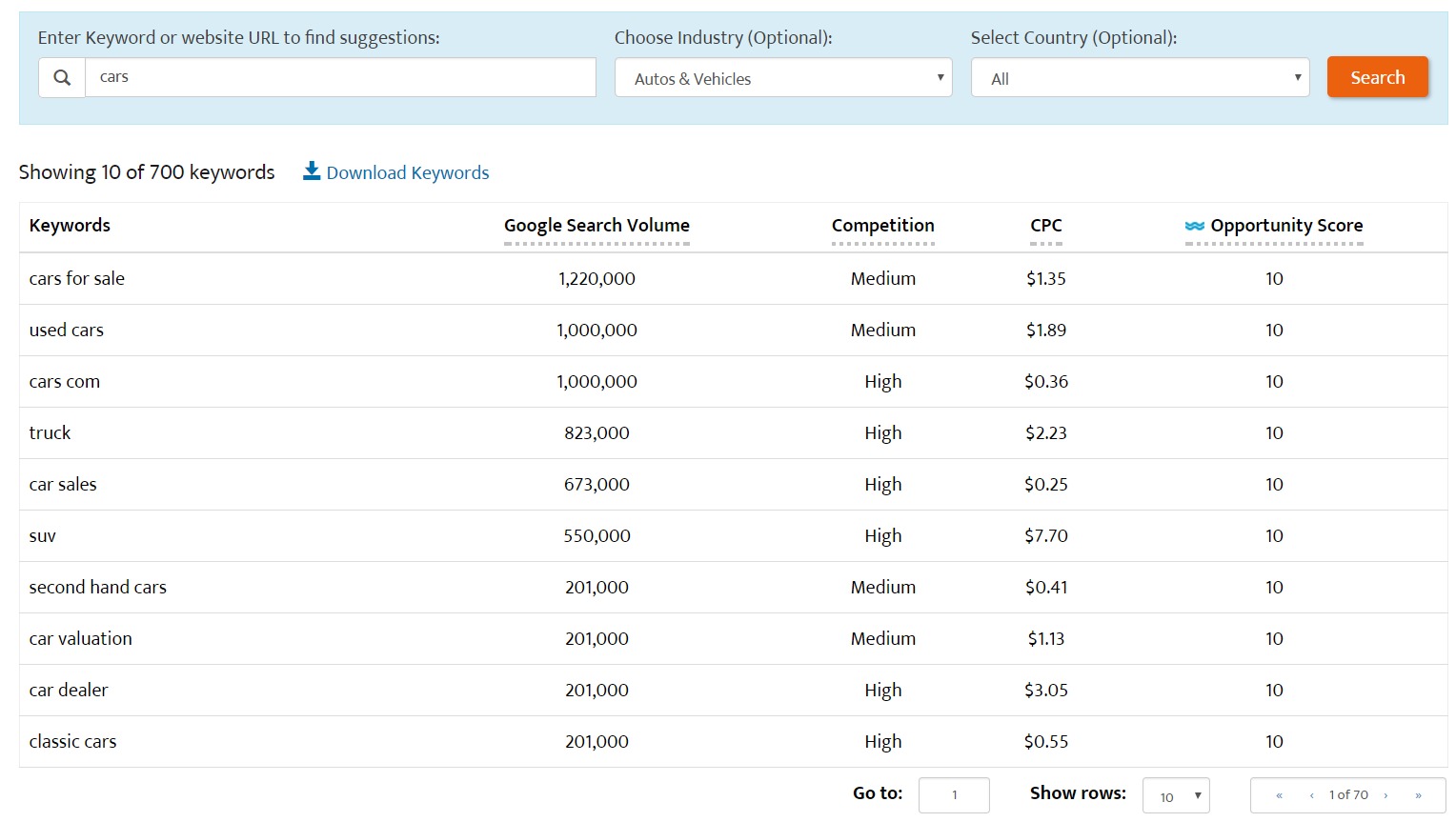
In the dynamic realm of digital marketing, understanding your competitors' keyword strategies is essential for optimizing organic search performance. This post explores the question, "How To Discover your competitors' best keywords?" delving into effective tools and tactics.
Uncovering the keywords that drive your competitors' success provides invaluable insights to refine your SEOstrategy, ensuring you stay ahead in the competitive online landscape. By decoding their approach, you gain a strategic advantage, guiding your own SEO marketing endeavors for enhanced visibility and success.
What Is Competitor Keyword Research?
Many times, when we talk about a rival's keywords, we mean both the keywords that your competitor ranks well for and the keywords that your top competitors are trying to rank well for but have yet to. Both groups can help you figure out what keywords to use for SEO. Some critical parts of the competitor keyword study are as follows.
- Identifying Competitors- Find out who your direct and indirect competitors are in your niche or business.
- Utilizing Keyword Research Tools- Using different online tools, like Google Keyword Planner, SEMrush, Ahrefs, and SpyFu, to find out what keywords your rivals are focusing on.
- It is analyzing Competitor Websites - Looking closely at the keywords that are used in the content, meta tags, titles, and headings of rivals' websites.
- They are monitoring Content Strategies - Looking at the blog posts, articles, and other content that your rivals have written to find common themes and keywords that they use a lot.
- Social Media Analysis- Looking at rivals' campaigns, posts, and interactions on social media sites to find the keywords they use.
Why Is Competitor Keyword Research Necessary?
Looking at the buzzwords that your competitors are using can help you find helpful information for your content marketing plan. You can do the same thing by finding content that works well for a related audience.
This can show you the things they use in their titles, meta descriptions, and text. Now that you have this knowledge, you can make intelligent choices about how to improve the ranking of your content.
By doing proper research on competitor keywords, you can find content gaps in your business that you can fill to make your site more visible in search results and reach more people. You'll also find new goal keywords that you might have yet to think of, as well as information on how to rank existing content ideas.
Most of the time, keyword competition is linked to keyword difficulty scores. This is a helpful way to figure out how hard it is to rank for keywords and find good ones to add to your list. As part of your SEO plan, looking at how other websites use keywords will help you figure out how to use these keywords in a way that already works.
How To Do A Competitor Keyword Analysis
Once you know what keywords to use, you can look at what your rivals are doing to get the most out of your keywords. If you haven't already, think of broad keywords from your niche. There are five easy steps you can follow to do a competitor keyword research.
Find Your Competitors
Find companies that work in your niche or market. To find rivals, you can look online, use industry directories, and look at your market.
- Find out who your competitors are in your niche or business.
- Explain the difference between direct and indirect rivals.
Research The Competition
Look into the websites, content, and marketing tactics of your competitors. Find out what their strengths and flaws are to learn more about how they use keywords and do SEO.
- Look at the content, structure, and strategies of your rivals' websites to figure out what works and what doesn't.
- Check out how they use marketing, social media, and online platforms.
- Watch how your rivals do in search engines and make a list of the keywords they're using.
Gather Competitor Keywords
Find out what keywords your rivals are using by using tools like SEMrush, Ahrefs, or Google Keyword Planner. For a complete picture, look at both organic and paid search terms.
- Find out what keywords your rivals are focusing on by using tools like Google Keyword Planner, SEMrush, Ahrefs, or Moz.
- Look at their paid ad keywords and organic search results.
- Look into long-tail keywords to learn more about niche areas.
Export Keywords
You can easily compare and analyze the phrase data that you have collected by exporting it to a spreadsheet. Include search volume, competition level, and relevance as measures to figure out how important they are.
- Export the keywords you've found to a file so you can look at them.
- To save the data in a CSV or Excel file, use keyword research tools.
Organize Your Results
Sort buzzwords by themes, how relevant they are, and how they might affect people. Focus on high-value keywords that are related to your business goals and the people you want to reach. You can use what you've learned to improve your keyword approach and SEO.
- Sort keywords by how relevant they are and how often people look for them.
- Focus on keywords that are important and useful and have a lot of searches.
- To make content development and optimization go more smoothly, group keywords by theme.
Types Of Competitor Keywords
Commercial Keywords
Commercial keywords, which are often linked to specific goods or services, show that you want to buy something. People who look for these keywords are seriously thinking about buying something, and there is a lot of competition among businesses that want to get these potential customers.
Transactional Keywords
It's clear that you want to make a purchase or do something specific when you use transactional terms like "buy," "order," or "subscribe." Competitors work on making their content better for these keywords to get people who are ready to buy.
Informational Keywords
Informational keywords show that a person wants to learn something or find an answer to a question. Competitors use these keywords to come up with helpful material that answers users' questions. Even though it's not directly about making sales, getting people at this point can help build trust and authority in your brand.
Navigational Keywords
People use navigational terms to look for a particular website or brand. Competitors use these terms in their SEO to make sure that their sites show up when people are looking for a particular place. In this kind of keyword competition, online visibility and brand recognition are often very important.
11 Best Tools To Find Competitor Keywords
These are the things that this round-up will talk about.
Wordstream's Free Keyword Tool
You can use WordStream's Free Keyword Tool to find rival keywords. It's one of the best ways to do it. WordStream's Free Keyword Tool lets us find competitor terms. How do we use it? Instead of a search term, just type in the URL of a rival and click "Search."
Buzzsumo
This is an excellent tool for content marketers to use to look at their rivals. One of BuzzSumo's best features is that it can help you find competitors you learned about.
Seranking
SE Ranking is an SEO tool that can be used for all kinds of competitive study. If you pay for a subscription, you can look at your competitor's backlink profiles, check their organic traffic and terms they rank for, and run a full audit to see how healthy their technical infrastructure is.
Serpstat
There is a full report on "Competitors in Organic Search" that Serpstat will give you, along with information about the organic and paid terms. Using different parameters, you can sort and filter the report to find the keywords that will work best for your SEO efforts.
Moz Keyword Explorer
MOZ term Explorer is a complete tool that digital marketers and SEO experts can use to understand and improve their term strategy. One of the best things about the tool is that it can find rival keywords, which can help you improve your content and SEO.
Semrush
The following tool we'll talk about is SEM Rush, which is an excellent set of keyword research tools that can help you quickly and easily find rival keywords. You can search by phrase or URL, sort the results by country or geographical area, choose from different match types for PPC keywords, and look at domain analytics data for whole websites.
Spyfu
Another well-known tool for competitive information that can help you find competitor keywords is SpyFu. SpyFu, on the other hand, is different because it is only used for competitive intelligence study.
Ahrefs
One of the most-read SEO blogs on the web is Ahrefs. Ahrefs also made a tool called Keywords Explorer. This isn't free, but it's a mighty one.
Google Auction Insights
Our following way to find competitor keywords is platform-specific, but it's too valuable to pass up: use Google Ads data to see which rivals are doing the best and what keywords they're ranking for.
Seed Keywords
This is something we often say at WordStream: facts about how people act are always better than guesses about how we think users will act.
It's essential to use A/B tests because they show us what people do, not what we think they do. But how can you use this idea when researching competing keywords? By asking a lot of people?
Tag Clouds
Do you know those word clouds that show you the words that are used most on a page or site? You can use this method to find keywords on your rivals' pages, even though it's usually only used to make cheap infographics or other visual assets.
Tips For Effective Competitor Analysis
No matter what tool you use to find out what keywords your main competitors are using; these tips will help you get more out of your study.
- Leave out brand-related terms. Use the filters to get rid of brand-related keywords from your list. It doesn't make sense to try to rank for them.
- Focus only on the keywords that are at the top of the list. Use the suitable filters only to see their top-ranking topics. These are the buzzwords that show up on Google in spots 1 through 10.
- Get rid of keywords that only get a few searches a month. Take things off your list that get less than 200 searches a month. The goal of researching your rivals is to find out which keywords bring them a lot of traffic.
- Pick long-tail terms to begin with. To rank, long-tail keywords are better than head keywords. Use the filters to see stories that have three or more words only.
With these easy tips, you'll be able to handle your keyword list better. As an example, Semrush says that search engine journals rank for more than 330K terms.
The number of keywords drops to 2,500,000 when the above filters are used. This is an excellent place to start looking for keywords to use in your SEO plan.
How To Use Your Competitor's Keywords
Identifying Relevant Competitors And Keywords
Find competitors that are important to your business as the first step in your competitor keyword analysis. Make a list of the important keywords you've learned from this study. For an effective way to speed up the picking process, use Surfer's Content Editor. After a short time, click on the answer that has a green check mark next to it.
Analyzing Competitor Keywords And Integration
After you choose your rivals, Surfer will look at their URLs and show you the most relevant keywords along with the best number of times to use them. In the editor's window, this information is shown on the right side.
If you click on a term, you can see how it is used on a competitor's page. As you type in these keywords within the recommended frequency range, they will turn green to make them stand out.
Enhancing Content With Competitor Keywords
Use the list of suggested words in your piece. These ideas, with the most important ones at the top, will help you get a better Content Score. Keep an eye on the Content Score as you add new keywords to make sure that your page is still in the proper range for those terms.
FAQs
How Do You Identify Competitors' Keywords?
Analyze competitors' websites, use keyword research tools, and monitor their content to identify keywords they are targeting.
How Do I Find My Best Keywords?
Conduct thorough keyword research using tools like Google Keyword Planner and assess relevance, search volume, and competition to identify the most effective keywords for your content.
How Do I Extract Keywords From Competitors?
Use competitor analysis tools and review their content, meta tags, and backlinks to extract keywords that contribute to their online visibility and success.
How Do I Find Winning Keywords?
Focus on keywords with a balance of high search volume, low competition, and relevance to your content, ensuring they align with your business goals and target audience.
Conclusion
I hope that you have understood how to discover your competitors' best keywords. Competitor keyword research is a crucial aspect of developing a robust SEO strategy. By identifying direct and indirect rivals, analyzing their websites and content strategies, and utilizing tools like Google Keyword Planner, SEMrush, and others, businesses can uncover valuable insights.
This includes discovering high-impact keywords, understanding content gaps, and refining SEO approaches. Competitor keyword analysis helps in optimizing content, improving search rankings, and gaining a competitive edge.




